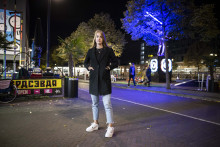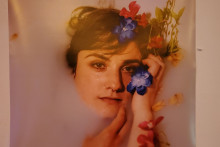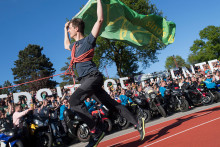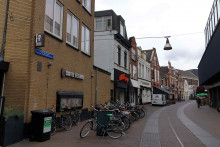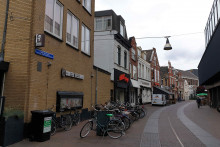‘I never would have expected my initiative to become as big as it has. I started the petition because I was fed up with women not being able to walk the streets in the centre of Enschede without being harassed in one way or another and I wanted to do something about it. The number of responses and the media attention were overwhelming. I remember fumbling calls from well-known news shows while trying to get some exercise. My father was completely shocked when he got an early call one morning from radio DJ Giel Beelen, asking for me. I am a student after all, so I was still asleep at that time and didn't answer my own phone.’
Very exciting
‘The TV show Op1 invited me to come talk about harassment on the streets together with VVD MP Dilan Yeşilgöz. That was very exciting. I remember sitting in the studio and thinking: ‘When this is all over and if I can tell my story as a nineteen-year-old student on national TV among such heavyweights as Yeşilgöz, I will never have to be nervous about anything ever again.’
The ball in the municipality's court
‘Besides a ton of publicity, the petition also resulted in 17,000 signatures. I took a step back then. The publicity was quite overwhelming and I thought the ball was now in the court of the politicians. Luckily, the municipality of Enschede took the problem very seriously. I had some wonderful talks with PvdA alderman Yara Hummels in particular. The mayor was sympathetic as well, but as a woman, Yara has first-hand experience with catcalling. That made it easier to talk to her about it.’

Political game
‘The discussion threatened to derail when a Tubantia journalist asked me about the background of the men responsible. They looked to be of North-African descent, I replied honestly. Suddenly, Thierry Baudet and Geert Wilders also had a lot to say about my initiative. I refused to play that political game, however. Luckily, I was able to rectify the situation by saying that white men are also guilty of sexual harassment.’
Good result
‘Following my petition, extra sweeps were conducted and BOAs and police issued fines. The most notorious group of men, which I've heard consisted of drug offenders from Rotterdam, has disappeared and the nuisance has decreased significantly. Women are now able to go to the supermarket without hearing any sexually suggestive remarks or being intimidated in other ways. Men also tell me they feel safer now. I am quite proud of that. All that effort led to some good results.’
Being yourself
‘All in all, it was a very special and exciting time that I would not have missed for anything. It was also quite intense. I got so much feedback online that I felt at times like everyone in Enschede knew who I was and was watching me. It's quite strange when people you've never met have such strong opinions about you. Without a doubt, the weirdest of them all was a woman who claimed I wasn't a real person and that Thierry Baudet had made me up. It was nice that I could simply be myself in front of my family and friends.’
Making a difference
‘The most important lesson I have learned from all this is that it is possible to bring about change by yourself. Don't think that it doesn't matter what you do, because it does; there are always people who are willing to listen to what you have to say and help out. Of course, this experience wasn't all positive. Especially online, people can be incredibly negative and crude. At one point, I simply stopped reading the comments. Above all, though, I remember all the positive and supportive feedback I got from people who had my back.’
Roller coaster
‘Would I do it all again, knowing what I know now? That's a good question. After the roller coaster of the past few months, I am glad to just focus on my studies again. Still, I do believe I would take action if I encountered injustice again. I know from first-hand experience that one person can truly make a difference. So no, the world has not seen the last of me yet.’



